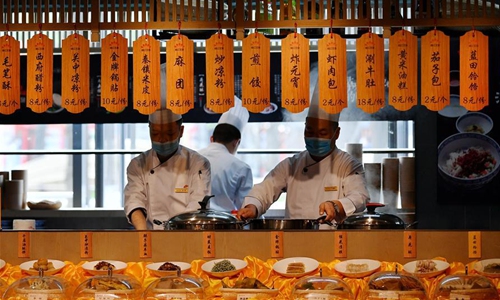
Chefs prepare meals at a restaurant on a commercial street near the Giant Wild Goose Pagoda scenic spot in Xi'an, northwest China's Shaanxi Province, April 23, 2020. The commercial street featuring Tang Dynasty style elements and rich cultural characteristics, has become a tourism landmark in Xi'an. (Xinhua/Zhang Bowen)
The Caixin services Purchasing Managers Index (PMI) in, a gauge of China's services sector activity, showed a slight rebound in April from March though it is still stuck in the contraction territory as China experienced great stress from sluggish overseas orders and impacted domestic industries while it tried to return its economy to normal.
However, some Chinese economists remain upbeat, saying the economic rebound will continue and could appear more evident from May.
The Caixin services PMI stood at 44.4 in April, up from 43 in March. The reading was well below the 50 mark that separates expansion from contraction.
The data reflected a continued decrease in demand in the services industries, particularly in foreign orders but also domestic demand. In April, new export orders in services industries fell markedly to their second-lowest level since September 2014 amid business closures and restriction measures due to the coronavirus pandemic, according to the Caixin data.
Caixin's earlier data also showed that China's manufacturing sector was struggling with pressure triggered by the coronavirus. The Caixin manufacturing PMI was recorded at 49.4 in April, down from 50.1 in March.
According to Zhong Zhengsheng, director of macroeconomic analysis at consultancy CEBM Group, China's economy has taken a rather serious blow from exports in April, which will have knock-on effects in resident income, consumption and investment.
Zhong also noted that positive stimuli, such as consumption and infrastructure rallies, are still not enough to withstand the sharp decrease in overseas demand, and the domestic economy is still burdened with the ongoing slowdown.
Liu Xuezhi, an economist at the Bank of Communications, noted the Caixin data reflected a "weak" rebound in many business sectors in China, including consumption and tourism.
"But I think that's normal, considering foreign demand is hampered by the pandemic and a recovery must take place step by step following the heavy blow the coronavirus has dealt to China," Liu told the Global Times.
He also said that China's economy will rebound gradually over months, and GDP might bounce back into positive growth in the second quarter.
China's GDP contracted 6.8 percent in the first quarter, the first quarterly decline since China began reporting GDP data in 1992.


